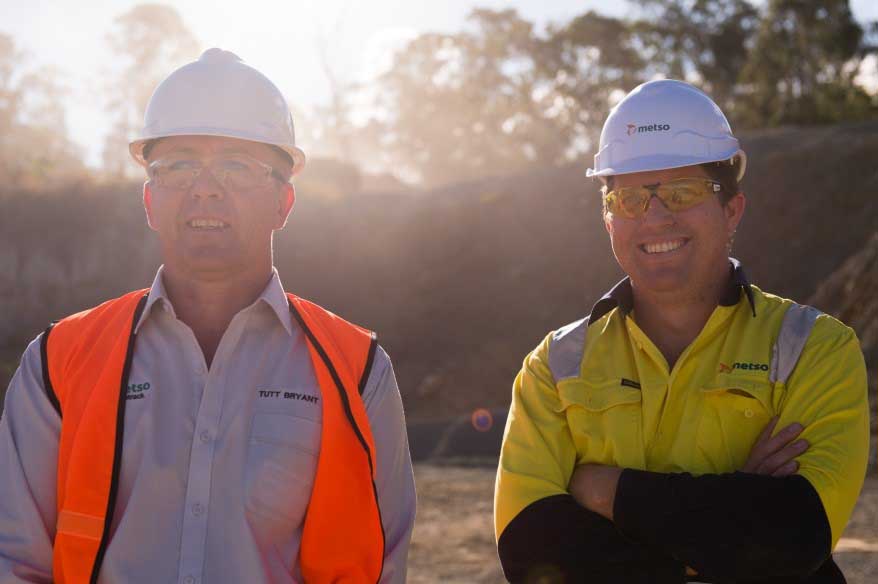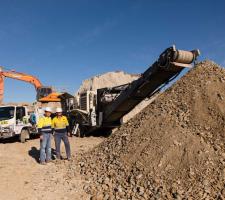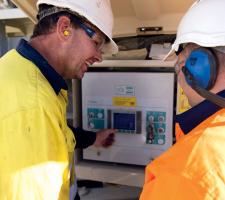
RSSWith Australian infrastructure construction driven by the country’s mining boom petering out, and the tipped recovery in demand for quarry products from a resurgence in residential building activity delayed by the high Australian dollar, quarry owners, operators and contract crushing companies need efficient plant solutions more than ever. For one firm, Guy Woodford reports, Metso’s Lokotrack LT106 jaw crusher is meeting this urgent need.
Australia’s depressed demand for quarried construction materials is not only challenging national quarry owners, operators and contract crushing companies’ profitability; it’s testing their ability to stay in business altogether.
During the infrastructure and residential construction boom, companies geared up to meet peak demand in full and on time with little concern for operating costs and process efficiency. But as market prices weaken, companies are shifting their focus from maximising output to minimising costs and improving their productivity.
Despite the downturn, in early 2014 Pro Crush found it was in need of an additional mobile crusher. Richard Hill, Director of Pro Crush, explains: “Many quarry owners and operators have their own plant which can produce the required quality and quantities on time. But under current market conditions they are finding their running costs too high or their plant too expensive to maintain. Since Pro Crush specialises in contract crushing work, our offering has always needed to be cost-efficient. This has positioned us well to provide quarry owners with end-to-end solutions that keep them competitive and profitable in their supply contracts.”
Hill says that with Pro Crush’s mobile equipment the firm can quickly establish a job site, run operations and then move on when the contracted quantity has been produced. “Much of the new work we are undertaking involves the operation of crushing trains for major quarry owners. It is this type of business that has bucked the downturn trend for us, and early this year we picked up a string of contracts of this nature, and so found ourselves in need of additional mobile crushing plant,” he adds.
A typical outsourced crushing contract sees the quarry owner paying for machine fuel, which can represent up to 40% of the total operational costs. In choosing a contract crushing partner such as Pro Crush, not only do quarry owners have to consider the labour rates and track record of the contractor, they must also scrutinise the equipment that will be used.
For example, whilst Pro Crush does its own due diligence on the production rates, final product quality, and durability of the equipment it selects, it’s the company’s careful consideration of running costs including fuel consumption that is said to be most recognised by its customers. Pro Crush believes that choosing equipment with the best performance in all of these areas gives it a competitive advantage in winning work.
Of the lead-up to the purchase of the new crushing plant required to cope with Pro Crush’s increase workload, Hill says: “Our information was that
Tutt Bryant Equipment, Metso’s exclusive Australian distributor for mobile equipment, had a Lokotrack LT106 in stock in Sydney. Hill promptly signed the paperwork, took delivery of the machine and placed it on a float headed for a client’s site in Victoria all in the same week that he’d initially contacted Guilfoyle.
Guilfoyle believes the speed with which the transaction occurred was down to two key factors. Firstly the machine was available ex-stock, but more important was Hill’s confidence in Metso’s mobile crushing and screening equipment which he had acquired during the 10 years that he had spent working on the maintenance, field service and sales of Lokotracks prior to joining Pro Crush as a business partner in 2009.
This experience provided Hill with a strong appreciation of the comparative benefits of Lokotrack equipment which he believes is a premium product that sets the benchmark in performance, reliability and longevity.
While the first job for the LT106 was as the primary crusher in a crushing train producing road base and aggregate for a Victorian road project, its next job was working overburden at a quarry north of Brisbane to produce select fill for an infrastructure project. In this application, fuel economy was very important to the client as select fill is a relatively low value added product and any savings in operating costs have a big impact on profitability.
Pro Crush’s focus on efficiency extends across their entire fleet of equipment, and Hill estimates that on their next job, the fuel economy of the LT106 combined with the company’s other new equipment will return fuel savings of up to 50% better than the next alternative.
The machine’s superior efficiency is also said to be a win for the environment, as less fuel consumed means less CO2 emissions, which helps both Pro Crush and its clients reduce their carbon footprint. Quarry operators are under constant scrutiny as to their environmental impact, so engaging a contractor with equipment that can reduce their emissions is always a benefit.
“Whilst fuel economy is a key benefit of our mobile equipment, another area that we have focused on to assist machine owners is the mobility and transportability of our Lokotrack equipment”, says Peter Newfield, Metso’s Australasian Marketing Manager.
“Crushing contractors only get paid when their equipment is producing on their client’s sites. So the contractor’s ability to quickly pack up a machine, transport it to a new location and have it operating again as quickly as possible minimises unpaid downtime which strongly contributes to their profitability,” explains Newfield.
Of the rapid set-up of the new LT106, Pro Crush Operations Manager Bevan Heaslip said: “The LT106 has high clearance on both ends, making it easier to load. The hydraulic hopper sides, latching mechanism and radial side conveyor make it faster to set up on site and to prepare for transport.”
Pro Crush’s ability to reliably service its clients is directly linked to machine uptime so build quality and robustness are also very important. Commenting on the construction of Lokotrack mobile equipment, Heaslip adds: “Overall, Metso machines seem to be more strongly built and you get the benefit of better reliability and longer hours before a rebuild. Less frequent maintenance intervention also reduces the number of spares we need to hold.”
Metso’s Dealer Business Manager, Greg Clayton, works closely with Tutt Bryant, as well as the company’s New Zealand and Indonesia distributors. “This allows us to define their machine stock to ensure that together we can provide rapid service to our clients,” explains Clayton. “We also have an active training program for our distributor partners which helps them to provide accurate, consistent and up-to-date information to our end customers, wherever they are.”
Tutt Bryant’s long term outlook for mobile crushing is upbeat, believing that weakened market prices for quarry products will not rectify for some time and so the demand for more efficient, modern equipment will continue to grow. This led the company to recently expand its commitment to the sales and support of Lokotrack mobile equipment through the appointment of Paul Doran as its Australia Business Development Manager for Metso equipment.
“By the nature of their work, crushers have a lot of high value wear components so not only do we have to have the right machines in stock, but we also have to ensure that we stock the right components to support our customers,” says Doran. “We have put a concerted effort into bolstering our stock levels of wears and spares to support our bullish outlook on the market.”
Lokotrack LT106
Metso’s design of the Lokotrack LT106 mobile sets benchmarks for compact size and agility in the 40tonne size-class. Being on tracks and with good chassis clearances, the LT106 is more easily and safely loaded onto a trailer, which reduces transport costs within and between crushing sites. Thanks to the feed hopper sides, with a patented and hydraulic securing system and radial side conveyor, the unit is said to be ready for crushing or transport within minutes. The LT106 is powered by a










